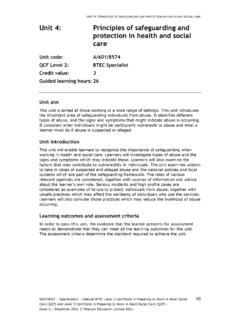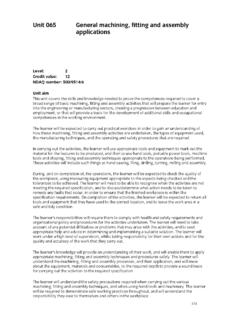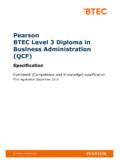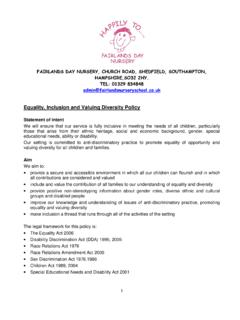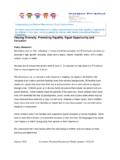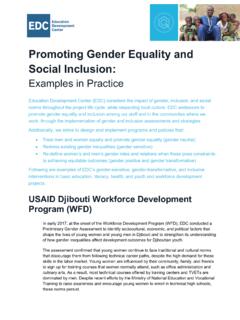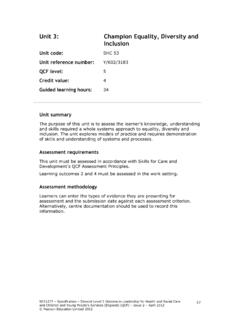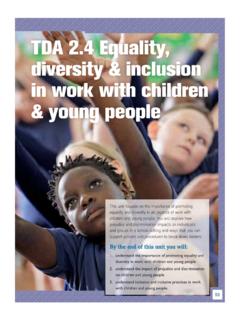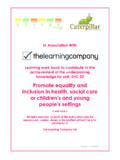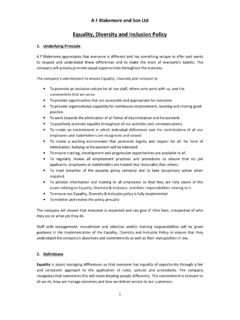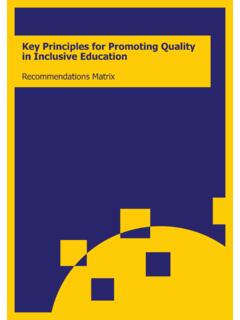Transcription of Unit 5: Promote Equality, Diversity and Inclusion in Work ...
1 BA029026 Specification Edexcel Level 3 Award/Certificate/Diploma specialist qualifications in Supporting Teaching and Learning in Schools (QCF) Issue 2 June 2011 Edexcel Limited 2011 73 Unit 5: Promote equality , Diversity and Inclusion in work with Children and Young People Unit code: M/601/4070 QCF Level 3 Specialist Credit value: 2 Guided learning hours: 10 Unit aim This unit provides the knowledge, understanding and skills needed to Promote equality , Diversity and Inclusion in work with children and young people. It requires demonstration of competence in promoting equality and Diversity and supporting Inclusion .
2 Unit introduction All children and young people have a right to an environment which supports them in developing confidence, self-worth, resilience and respect for others. Fundamental to this is an understanding of how to ensure that equality , Diversity and Inclusion are embedded in every aspect of practice. This requires an understanding the effects of stereotyping, prejudice and discrimination on the wellbeing and learning of children and young people and development of the skills to challenge discrimination assertively. Diversity encompasses acceptance of and respect for individual differences in relation to race, ethnicity, gender, sexual orientation, socio-economic status, age, disability/physical abilities, religion or belief.
3 Embracing and celebrating difference ensures that all individuals are treated fairly, with dignity and respect. Being inclusive means thinking about and planning to take account of the circumstances of individuals in relation to the opportunities within school life they should expect to participate in. Everyone has a responsibility to Promote equality and implement inclusive practices, and to ensure that all legislative duties are fully implemented without discrimination. This unit gives learners the essential knowledge, understanding and skills required for working in schools. Learners will examine the legislation and codes of practice which are relevant to equality and Diversity and consider the importance of participation, equality of access and valuing and promoting cultural Diversity .
4 They will apply their learning by demonstrating the principles of equality , Diversity and anti-discriminatory practice in their interactions and work with children and young people. BA029026 Specification Edexcel Level 3 Award/Certificate/Diploma specialist qualifications in Supporting Teaching and Learning in Schools (QCF) Issue 2 June 2011 Edexcel Limited 2011 74 Learners will study the impact of discrimination on children and young people and explore how their own attitudes and behaviours impact on practice. Learners examine the importance of anti-discriminatory practice and how to challenge discrimination.
5 Learners will study Inclusion and barriers to participation which children and young people experience and demonstrate how they support Inclusion and inclusive practices in their own work with children and young people. Learning outcomes and assessment criteria In order to pass this unit, the evidence that the learner presents for assessment needs to demonstrate that they can meet all the learning outcomes for the unit. The assessment criteria determine the standard required to achieve the unit. On completion of this unit a learner should: Learning outcomes Assessment criteria 1 Be able to Promote equality and Diversity in work with children and young people Identify the current legislation and codes of practice relevant to the promotion of equality and valuing of Diversity Explain the importance of promoting the rights of all children and young people to participation and equality of access Explain the importance and benefits of valuing and promoting cultural Diversity in work with children and young people Interact with children and young people in a way that values Diversity and respects cultural.
6 Religious and ethnic differences Demonstrate ways of applying the principles of equality , Diversity and anti-discriminatory practice in own work with children and young people 2 Understand the impact of prejudice and discrimination on children and young people Explain ways in which children and young people can experience prejudice and discrimination Analyse the impact of prejudice and discrimination on children and young people Evaluate how own attitudes, values and behaviour could impact on work with children and young people Explain how to Promote anti-discriminatory practice in work with children and young people Explain how to challenge discrimination BA029026 Specification Edexcel Level 3 Award/Certificate/Diploma specialist qualifications in Supporting Teaching and Learning in Schools (QCF)
7 Issue 2 June 2011 Edexcel Limited 2011 75 Learning outcomes Assessment criteria 3 Be able to support Inclusion and inclusive practices in work with children and young people Explain what is meant by Inclusion and inclusive practices Identify barriers to children and young people s participation Demonstrate ways of supporting Inclusion and inclusive practices in own work with children and young people BA029026 Specification Edexcel Level 3 Award/Certificate/Diploma specialist qualifications in Supporting Teaching and Learning in Schools (QCF) Issue 2 June 2011 Edexcel Limited 2011 76 Unit content 1 Be able to Promote equality and Diversity in work with children and young people Legislation and codes of practice: relevant to home country; range eg United Nations Convention on the Rights of the Child (1989), Children Act 1989, Children Act 2004, Human Rights Act 1998, Disability Discrimination Act 1995 and 2005, Special Educational Needs and Disability Act 2001, Race Relations (Amendment) Act 2000.
8 Guidance eg Removing Barriers to Achievement: government strategy for SEN (2004), Code of Practice on the duty to Promote race equality (2002), Disability equality Scheme, Every Child Matters (2005), Single equality Scheme(2009); school policies eg cultural Diversity , inclusive practice, safeguarding/bullying, gifted and talented pupils, special educational needs Participation and equality of access: Promote eg human right, moral right, legal right, sense of belonging and self-esteem, feel valued, motivates, encourages independent learning, raises achievement, equal opportunities, social opportunities Cultural Diversity .
9 Role eg ensures individuals are valued and included, enables effective relationships to be established, supports all pupils to understand cultures which are different from their own, encourages respect and acceptance, increases global awareness; how to value and Promote cultural Diversity eg using images which reflect a range of cultures, celebrations of festivals Interaction which values Diversity : values eg recognise the uniqueness of all, honesty, respect, dependability, integrity, confidentiality; interaction skills eg active listening, eye contact, facial expression Applying the principles of equality , Diversity and anti-discriminatory practice: follow policies of school eg behaviour, disability and gender equality , help children and young people to be included in all aspects of school life; eg adapting and modifying learning materials, using additional resources/specific equipment, giving pupils time to complete tasks; working with pupils on intervention programmes.
10 Undertaking training eg Makaton, Braille machine, avoid tokenism 2 Understand the impact of prejudice and discrimination on children and young people Prejudice and discrimination: discrimination eg individuals, institutional, direct, indirect Prejudice and discrimination: types eg race, religion, age, sex, culture, ethnicity; impact eg negative effect on self-worth/self-esteem, mental health, effect on social relationships Effect of own attitudes and behaviour: self-awareness eg affects relationships, impacts on learning, negative effect on promoting pupils to respect and accept others BA029026 Specification Edexcel Level 3 Award/Certificate/Diploma specialist qualifications in Supporting Teaching and Learning in Schools (QCF) Issue 2 June 2011 Edexcel Limited 2011 77 Promoting anti-discriminatory practice.

